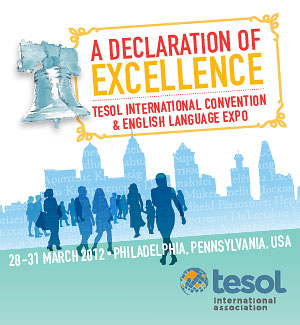 |
Rosa Aronson, PhD, CAE, Executive Director of TESOL International Association
What impact does globalization have on English language teaching and learning?
Globalization has seen the greater interconnection of countries and peoples around the world through business, technology, and culture. This has helped fuel the growth of English as a common language of communication. In many places around the world, English is used as the language of communication among people of different language backgrounds. In fact, there are more non-native speakers of English than native English speakers globally.
As a result, the demand for English language teaching and learning has grown exponentially. Many countries have incorporated the teaching and learning of English into their national curriculum, and English language teaching has become a huge growth sector.
International associations have more and more members from all over the world. What should they know about cross intercultural communication?
From its early days, TESOL International Association has had members from around the world, and we’ve seen this grow over time. As a result, we’ve long understood the importance of effectively communicating to a multilingual and multicultural audience. Although all of our members are involved in English language teaching, and therefore can understand the language, their cultural and language backgrounds are incredibly diverse.
One of the most important elements is to understand and recognize the different cultural patterns at work. For example, idiomatic expressions, or references that are culturally specific, should be avoided in your communications. If you are holding events in other countries, understand that culture will play a role in the expectations and behaviours surrounding all elements of the event (planning, programming, registration patterns, etc.). Intercultural communication really starts with self-awareness and active listening.
Please share with us the top three challenges for TESOL these days.
The diversity within our membership is one of our greatest assets, but also presents a challenge as all members come to TESOL International Association with different needs and expectations. Our members work in all aspects of English language teaching with learners at all levels, and so the challenge for the association is to be able to meet the needs of all of them equally.
Although the TESOL field is a unique academic discipline backed by a body of research, it is often not recognized as such outside – or sometimes even inside – education circles. One of our biggest challenges is to correct that, and to promote and advance the field so that it can be recognized for what it is and what it has to offer.
Similarly, one of our challenges we now hope to overcome is simply that of name recognition. When the association was founded in 1966, it really helped create and shape the field of Teaching English to Speakers of Other Languages (TESOL). Up until recently, the name of the association was indistinguishable from that of the field as a whole, which often led to confusion as the acronym TESOL became widely used for programs, events, and services throughout the field. Now with our new logo and name – TESOL International Association – we can better communicate who we are and our role in relation to the field.
As theme for your TESOL International Convention & English Language Expo from 28 to 31 March 2012 you chose “A TESOL Declaration of Excellence.” Why?
The annual TESOL International Convention and English Language Expo is the largest event of its kind worldwide, and we are encouraging our members and attendees to take the opportunity to declare their vision of excellence in all aspects of the profession. While TESOL International Association has come a long way in the last 46 years, it is vital for English language teachers to come together to discuss and share issues of concern about, and ambitions for, the field of English language teaching. This year, participants are invited to reflect on their practices, voice their opinions, and declare their pursuit of excellence in the English language teaching profession.
Why did you select Philadelphia as destination for your annual convention 2012?
The TESOL International Convention and English Language Expo is our flagship event, and is held annually in different locations in North America. What drew us to Philadelphia is its combination of rich cultural history and its diversity. Its historical significance as the birthplace of American democracy has appeal for our US attendees, but our international attendees will also find a global city with diverse cultures. It is unique in that it has all the excitement of a big city along with a broad array of neighbourhoods that give it a small-town atmosphere.
Founded in 1966, TESOL International Association is a professional community of educators, researchers, administrators and students committed to advancing excellence in English language teaching for speakers of other languages worldwide. With more than 12,000 members representing 156 countries, TESOL International Association fosters the exchange of ideas, research and peer-to-peer knowledge, and provides expertise, resources and a powerful voice on issues affecting the profession. Its mission is to advance professional expertise in English language teaching and learning for speakers of other languages worldwide. For the 2012 International Convention & English Language Expo at the Pennsylvania Convention Center, Philadelphia, the association is expecting 5,000-8,000 delegates. www.tesol.org